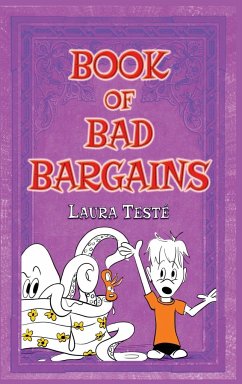
The Man with Bad Manners -- L'homme aux mauvaises manières
English-French Edition
Versandkostenfrei!
Versandfertig in 1-2 Wochen
15,99 €
inkl. MwSt.

PAYBACK Punkte
8 °P sammeln!
(Bilingual English-French edition / Edition bilingue anglais-français) This is the story of a very badly behaved man, how a young boy in the village hatches a plan to change the man's behavior - and how, with the help of the other villagers, the plan succeeds, to everyone's benefit. Children, of course, love the idea of an adult behaving badly. At the same time, the story helps them learn valuable lessons about initiative, negotiation, conflict resolution and cooperation. Rose Mary Santiago's illustrations provide delightful and amusing counterpoint to the tale. The Man with Bad Manners is on...
(Bilingual English-French edition / Edition bilingue anglais-français) This is the story of a very badly behaved man, how a young boy in the village hatches a plan to change the man's behavior - and how, with the help of the other villagers, the plan succeeds, to everyone's benefit. Children, of course, love the idea of an adult behaving badly. At the same time, the story helps them learn valuable lessons about initiative, negotiation, conflict resolution and cooperation. Rose Mary Santiago's illustrations provide delightful and amusing counterpoint to the tale. The Man with Bad Manners is one of an illustrated series of Sufi teaching stories from the Middle East and Central Asia that were collected and adapted for children by Idries Shah, and that have captivated hearts and minds for more than a thousand years. The stories are designed to help children learn to examine their assumptions and to think for themselves. In the Sufi tradition, there is a continuum between the children's story, the entertainment or folklore story and the instructional or instrumental story. A story can help children deal with difficult situations and give them something to hold on to, but it can also stimulate a deeper understanding in adults. C'est l'histoire d'un homme très mal élevé, comment un jeune garçon du village élabore un plan pour changer le comportement de l'homme - et comment, avec l'aide des autres villageois, le plan réussit, au profit de tous. Les enfants, bien sûr, adorent l'idée qu'un adulte se comporte mal. En même temps, l'histoire les aide à tirer de précieuses leçons sur l'initiative, la négociation, la résolution des conflits et la coopération. Les illustrations de Rose Mary Santiago offrent un contrepoint charmant et amusant au conte. L'homme aux mauvaises manières fait partie d'une série illustrée d'histoires-enseignement soufies du Moyen-Orient et d'Asie centrale qui ont été rassemblées et adaptées pour les enfants par Idries Shah, et qui ont captivé les c¿urs et les esprits pendant plus de mille ans. Ces histoires sont conçues pour aider les enfants à apprendre à examiner leurs hypothèses et à penser par eux-mêmes. Dans la tradition soufie, il existe un continuum entre le conte pour enfants, le conte divertissant ou folklorique et le conte pédagogique ou instrumental. Une histoire peut aider les enfants à faire face à des situations difficiles et leur donner quelque chose à quoi s'accrocher, mais elle peut aussi stimuler une compréhension plus profonde chez les adultes.












